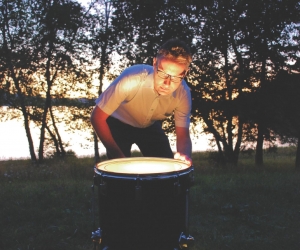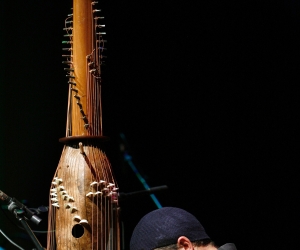
After following the enigmatic whooshes, dangling creaks, and scene-stealing clunks around the evocative sonic space of Okno, I was not surprised to learn that its composer, Rocío Cano Valiño, has a background in interior design—a talent she employs in the various collaborative, multidisciplinary projects she’s pursuing in Lyon, France, where she is based.
“Space is very important in electronic music—the physicality of the sound,” she told me, during a video chat in late August.
Okno, first-place winner in Musicworks’ 2020 Electronic Music Composition Contest, is a stereo electroacoustic piece filled with familiar-sounding activity that is punctuated with sly moments of stillness and unexpected interruptions. As your ears begin to catch the crisp, close, often delicate “indoor” sounds, the more distant “outdoor” sounds—drones, roars, and thuds—strive to break through and sometimes take over. All the while, Cano Valiño plays with the listener’s spatial orientation while keeping her sonic storytelling purposeful and engaging.
“The idea of the piece started with the recording of machines,” she said. “I love the little sounds machines make—like the reel-to-reel tape recorder—and I like to record those sounds: just pushing a button and then recording what happens.
“I love taking sounds out of their usual context and creating a feeling of movement so that the listener can follow a path.”
The piece was initially inspired by a short story by notable Argentine writer and poet Silvina Ocampo (1903–93) entitled “Okno, el esclavo” (Okno, the slave). Ocampo, whom Argentine writer and filmmaker Edgardo Cozarinsky once called “the best kept secret of Argentine letters,” wrote over a hundred short stories, as well as novellas and poetry. Since her death she has been rediscovered not only by Argentina’s younger generation, but also by English readers, thanks to recent translations of her work.
“She writes in a way that the story can have multiple interpretations—it might be a personal story but we don’t know for sure,” said Cano Valiño, who also described the story in the program note for the piece’s premiere. “In the tale the idea of the real and the fictitious is always present, at the uncertain border between dream and reality. [The story] also describes the invention of the imagination.”
Currently pursuing a bachelor’s degree in contemporary composition at the Conservatoire National Supérieur Musique et Danse de Lyon, the Argentina-born composer had an opportunity to work at the legendary Groupe de Recherche de Musique Concrète (GRM) in Paris, France.
“I had always dreamed of writing a piece there,” said Cano Valiño, who had been commissioned by Radio France to write a piece for the radio program Création Mondiale. “Each week the program premieres a new piece by a different composer. Listeners can hear different composers and learn about our backgrounds and the construction of the pieces.”
Okno, which premiered February 14, 2020, at the Festival Présences at the Maison de la Radio in Paris, is also the inaugural winner of the Marcelle Deschênes Prize in Electronic Music, which was established last year as a new prize in Musicworks’ annual Electronic Music Composition Contest and is supported by a generous donor. The prize is named after the Quebec multimedia artist, composer, and teacher, known for her deep interest in technology and the arts, and her role as a founder or director of notable electronic-music and arts organizations. The annual prize is awarded to a self-identified female or nonbinary composer with an entry in that year’s EMC Contest.
Like Deschênes, Cano Valiño is devoting considerable time and creative energy to new initiatives. She is one of the founders of the newly created Ensemble Orbis, which aims to develop multidisciplinary works centred in electronics. Next year will see the world premiere of Antrum Agora, a work described as a spectacle for percussion quartet, video, and electronics, which involves image and movement as well as sound.
And in October 2021, a new Cano Valiño piece will world premiere along with four other new pieces, as part of Confluence, a France-Canada commissioning coproduction involving Montreal-based Ensemble Paramirabo and the French ensembles Proxima Centauri and HANATSUmiroir.
Learn more about Rocío Cano Valiño. Audio: Okno.


